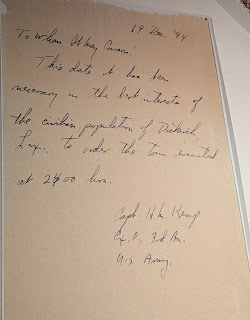A few miles away from the town of Ettelbruck which Steven and I had just toured was the town of Diekirck. It's known now for Luxembourg's most famous beer but for those of an older generation as the location of the Battle of the Bulge, a pivotal battle during the war when American troops crossed the river here on January 18th, 1945. The city is home to the Grand Duchy's military headquarters and the country's most important military museum, the Musée National d'Histoire Militaire.
Before WW2, there was no sizeable patriotic tradition in Luxembourg but that changed in 1939 with the celebration of the 100th anniversary of national independence when many citizens became aware they belonged to a small but independent nation with its own traditions. No doubt Hitler's rise to power and the imminent threat of war from their next-door neighbor was behind a Minister's memorandum from the year before which stated that "it is the Government's opinion that the Independence celebrations must reach the goal of unifying all social classes through a common patriotic spirit and of proving our right to exist, our vitality and our desire to stay independent to the foreign countries."
Several months before invading Luxembourg, Hitler congratulated the Grand Duchy on its independence.
In 1940, right in the middle of the Phony War, Luxembourg still held onto its status of "disarmed neutrality." Its forces consisted of 268 police officers and 425 members of the Compagnie des volontaires. It was a case of too little, too late when the government ordered the construction of a defense line along their border with Germany to delay a German advance in the event of an attack. When Germany invaded the Grand Duchy on May 10th, 1940, the tiny country experienced the most somber period in its history because, for the second time since its independence in 1839, Luxembourg was at risk of disappearing as a sovereign nation.
A few months later, when German became the only official language, streets, and stores were Germanized and French was banned. "Luxembourg must be German!"
To 'reeducate' the locals, the Germans took complete control of the media, strongarmed people into Nazi organizations, and 'cleansed' the schools and the world of culture of any elements considered 'un-German.' Reading this was so frightening as there are elements in present-day American society banning books on a level never done before and re-writing history books that have become the new norm.
In a policy called Gleichschaltung, all reminders of Luxembourg's independence were eradicated from the public realm: monuments, flags, stamps, and portraits of the Grand Duchess were gone. In the late summer of 1940, Luxembourgers wore patriotic badges as a symbol of protest against the German annexation plans and when the Nazis tore down the famous Gëlle Fra or Golden Lady monument from WW 1.
However, when the country was formally integrated into the German district in 1941, all political parties, Parliament, and the State Council were disbanded. The national economy was redirected to Germany's needs. That October, a clear majority of the population declared they were "three times Luxembourgish" when asked about their native language, nationality, and ethnicity in a census, refusing to comply with Nazi wishes.
While Luxembourg's government in exile in London sought to regain the country's independence, some of its citizens joined Allied forces and the French and Belgian resisters. The Luxembourg Battery later participated in the liberation of Europe.
At the end of August and the beginning of September 1942, spontaneous strikes occurred at many sites to decry the forced conscription of young Luxembourgers in the German Wehrmacht or united armed forces. To quash the strike, 21 ringleaders were sentenced to death and executed.
I urge you to click on this photo to enlarge the extremely moving prayer General George Patton, the Commander of the US Third Army, wrote to God in mid-December of 1944 beseeching Him for better weather for four days for his troops.















As we celebrate Thanksgiving weekend in Canada, I remain deeply thankful to all the allied troops who were instrumental in liberating Europe from the clutches of Nazi rule during WW2. And thank you for including Patton's letter to God imploring the Good Lord to alter the weather patterns to assist the allied troops... fascinating. xo Lina ox
ReplyDeleteI had the same takeaway, Lina, as you from the museum - namely that stirring letter, aka the Weather Prayer. Don't you have to wonder, however, if the German commander may have been imploring God for something else to help their cause? Thank you for the poignant reminder about being especially mindful of what ALL the Allies did to liberate Europe as Canadians celebrate Thanksgiving this weekend. Love and hugs from Djerba Island, Tunisia
ReplyDelete